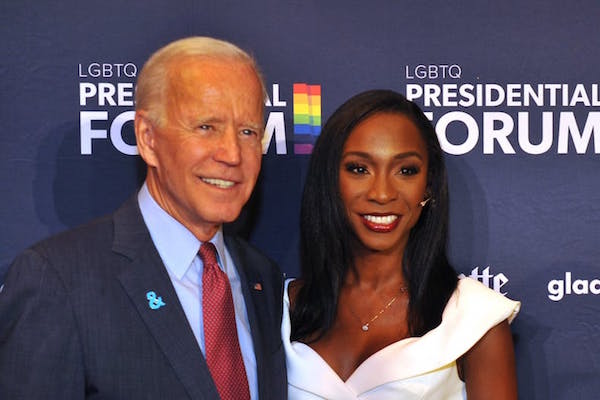After three presidential debates without a single question on LGBTQ rights, ten Democratic candidates gathered in Iowa on Friday, September 20 for the LGBTQ Presidential Forum sponsored by GLAAD, One Iowa, The Gazette, and The Advocate. Featured in the forum were presidential candidates Cory Booker, Joe Biden, Pete Buttigieg, Julián Castro, Tulsi Gabbard, Kamala Harris, Amy Klobuchar, Joe Sestak, Elizabeth Warren, and Marianne Williamson.
Transgender advocate and Pose actress Angelica Ross began the night as the forum’s host by stating that black trans women of color matter and asking how the next president would protect black trans women. The epidemic against transgender women of color came up a few times during the forum, from candidates such as Booker and Castro. But perhaps the most striking was when Warren began her opening statement by naming all eighteen transgender women of color who have died this year and declaring: “It is time for a President of the United States of America to say their names.”
The two-hour event streamed on YouTube involved individual segments with each candidate, which all started with the broad question: if elected President, what will you do to protect LGBTQ rights in the first 100 days? Most candidates mentioned the repeal of the transgender military ban, passing the Equality Act, and combating the HIV/AIDS epidemic. More uniquely, Biden said that in his first 100 days, he would thank LGBTQ people for coming out, and reverse Trump’s undoing of Obama’s LGBTQ executive orders, while Gabbard spent her time discussing the high financial cost of war.
After tackling what they would do in the first 100 days, each candidate sat down with a journalist or local advocate to answer more specific questions about their past and their plans to protect the LGBTQ community. Many of these questions touched on topics that have been particularly controversial or problematic for the candidates. For instance, Williamson was asked about her past comments on HIV/AIDS, about which some claim she said that positive thinking could cure the disease. During the debate, she vehemently denied this accusation, calling it a “smear” and instead spoke about her work with Project Angel Food, a meals-on-wheels program that serves people with AIDS living in the Los Angeles area.
Harris, too, was pressed on some of her past positions, including her denial of gender reassignment surgery to a transgender person while she was Attorney General of California. She responded by explaining that at the time, this was the policy of her client, the California Department of Corrections, and she later was able to get them to change the policy.
Similarly, Joe Biden was questioned about his support for criminal justice reform that had a disproportionately negative impact on LGBTQ people of color. He was also asked about his initial support for Don’t Ask Don’t Tell, and the Defense of Marriage Act and his remarks that Vice President Mike Pence is a “decent man.” His response that he was the first person to nationally come out in support of marriage equality and thus “didn’t have to evolve” made headlines shortly after the forum.
Apart from Warren’s remarkable opening statement, other standout moments from the night came from Booker, who remarked that LGBTQ rights have “have been an urgent part of my life for my entire career.” He also spoke about very specific plans for LGBTQ protections including police training on implicit racial bias and covering Prep through health insurance, later declaring: “It’s about time we have a woke president on these issues.” Klobuchar, too, shined when she answered a question from a survivor of Pulse and spoke passionately about the importance of gun control and universal background checks.
Despite these remarkable instances, it is hard to crown a defining moment or a clear winner from the forum. If anything, LGBTQ people across America are the ones with a landslide victory, for this forum provided a much-needed time and place to address many of the serious issues facing the LGBTQ community in the next presidential election.
The next substantive discussion of LGBTQ issues is HRC and CNN’s LGBTQ town hall, set to air on October 11, National Coming Out Day, at 7 p.m.


